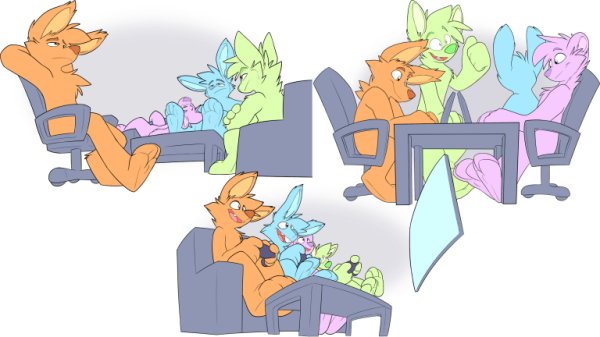Search
Items tagged with: Success
Furward Momentum (Introduction)
- Building Your Support Network and/or Team
- Mapping the Technology Landscape
- Learning the Fundamental Skills
- Choosing Your Path
- Starting and Growing an Open Source Project
- Building Your C.V.
- Getting Your First Tech Job
- Starting a Technology Company
- Career Growth and Paying It Forward
If you’ve been following along with all of the entries in this series that precede the on you’re reading right now, you should have all of the following in your arsenal:
- Real-world experience with the technology you’re interested in working with professionally, as evidenced by your open source project experience and your other C.V.-building work.
- A think-tank of people you’ve worked with on said projects whom can provide professional references and/or letters of recommendation (especially if they get a job in the industry first).
- Fundamental skills (regardless of whether or not they’re demonstrated by your open source experience).
Or, as an employer looking over a pool of applicants will read it, you have:
- Real Experience
- Soft skills
- Hard skills
If you felt, at the beginning of this journey, that you’d never get a job in technology without a four-year degree or somehow meeting the minimum “X years of experience” list items common in job postings, you can safely lay these fears to rest.
By the time you’re ready for this page, you’re more than ready for a job in the technology industry. All you need to do is find your first technology job.
An Open Secret About Careers in Technology
Technology companies suck at hiring. Software companies are some of the worst offenders.
Something to remember: Most software companies are always hiring, regardless of what the Careers section of their HR website says.

You may be contacted by Recruiters from staffing agencies. Avoid them. (If you’re really desperate and have to rely on them for your first job, fine, but don’t make it a habit. Your wallet will thank you for heeding my advice.)
Additionally, you’re better off forgetting traditional job boards (Monster, Indeed, etc.); they’re pretty awful.
A much better way to find a good technology job is to hop on a Discord/Skype call (or, when this pandemic ends, an informal coffee date) with a hiring manager for a company in the industry you want to work in.
Where do you find the hiring managers for such companies? Ask the connections you’ve gained from your open source contributions. (Some of them may even skip this step and ask you if you’re available for an interview.)
But if that well runs dry, there’s always the monthly Who is Hiring? posts on Hacker News.
The Typical Tech Hiring Process
The typical tech job hiring process is as follows:
- You submit your application, with a résumé.
- The company contacts you with an initial phone screen, and sets up a formal job interview.
- Before COVID-19, you typically would fly out to the company headquarters and be subjected to a gauntlet of 5-8 smaller sessions with different interviewers, each interested in a different question or whiteboard problem. These days, everything seems to be done remotely. (I don’t know what the future holds, but I do hope you’re given an option so you can choose which ever you’re most comfortable with.)
- If your interview went well, you’re given a formal job offer with a compensation package. Assuming you pass your background check, you’re hired. (In many states, this is the first point they’re legally allowed to inquire about your criminal history.)
A lot of companies have started to realize that the gauntlet in step 3 is sub-optimal for finding talented technologists, and instead opt for a work-sample test.
Work-sample tests mostly look like this:
Here’s a mostly-complete software program (.zip file). Add a feature/widget that does X, Y, and/or Z. We will test it in A, B, and C ways. We’re looking for comments/correctness/test coverage/etc.You have [e.g. one week] to complete this, at your own pace, but please do not spend more than [e.g. four hours] on it.
A typical work-sample test prompt.
Successfully completing a work-sample test is usually followed by another interview, but if you get that, you’re probably going to be handed an offer.
How Should I Prepare?
There are a lot of guides on the Internet that cover this in detail.
My advice? Revisit your fundamental skills, and trust in the experience you’ve gained.
If you do not get the job you interview for, keep in mind:
Unsuccessful people vs Successful people.Learn from your mistakes and fail forward.#Success #Failure #Fail #Successful #Entrepreneur #Business pic.twitter.com/Mjj5MuaSvL
— Growth Hackers 🚀 (@StartGrowthHack) November 7, 2019
If you do get the job you applied for, you’ll want to read Patrick McKenzie’s guide to salary negotiation.
Avoid Unpaid Internships
https://www.youtube.com/embed/S35X8lGxGPI?feature=oembed
If you’re not being paid a fair market rate for your work, you shouldn’t be doing any useful work for a company. Rather, the internship should only be benefiting you, not the employer.
Next: Career Growth and Paying It Forward
https://soatok.blog/furward-momentum-getting-your-first-tech-job/
I probably don’t need to remind anyone reading this while it’s fresh about the current state of affairs in the world, but for the future readers looking back on this time, let me set the stage a bit.The Situation Today
(By “Today”, I mean early May 2020, when I started writing this series.)In the past two months, over 26 million Americans have filed for unemployment, and an additional 14 million have been unable to file.
Federal Reserve chairman, Jerome Powell, says we’re in the worst economy ever.
In a desperate bid of economic necromancy, many government officials want to put millions more Americans at risk of COVID-19 before we can develop a vaccine and effective treatment. And we still don’t even know the long-term effects of the virus.
I’m not interested in discussing the politics of this pandemic or who to blame; I’ll leave that to everyone else with an opinion. Instead, I want to acknowledge two facts that most people probably already know:
- This was mostly avoidable with competent leadership and responsible preparation
- Most of us have rough times ahead of us
I can’t do anything about the first point (although most people are focused on it), but I want to try to alleviate the second point.
What This Series is About
Whether you lost your job and need an income to survive, or you’re one of the essential workers wanting to avoid being sacrificed by politicians for the sake of economic necromancy, I wrote this guide to help you transition into a technology career with little-to-no tech experience.This is not a magic bullet! It will require time, focus, and effort.
But if you follow the advice on the subsequent posts in this series, you will at least have another option available to you. The value of choice, especially when you otherwise have none, is difficult to overstate.
I am not selling anything, nor are there ads on these pages.
This entire series is released under a Creative Commons Attribution-NonCommercial-ShareAlike 4.0 International License.
Why Work in Tech?
Technology careers aren’t everyone’s cup of tea, and they might be far from your first choice, but there are a couple of advantages that you should be aware of especially during this pandemic and lockdown:
- Most technology careers can be performed remotely.
- Most technology careers pay well.
The first point is especially important for folks living in rural areas hit hard by a lack of local employment opportunities.
A lot of the information and suggestions contained in this series may be applicable to other domains. However, my entire career has been in tech, so I cannot in good conscience speak to the requirements to gain employment in those industries.
Why Should We Trust You?
You shouldn’t. I encourage you to take everything I say with a grain of salt and fact-check any claims I make. Seriously.My Background
I’m currently employed as a security engineer for a cryptography team of a larger company, although I don’t even have a Bachelor’s degree. I’ve worked with teams of all sizes on countless technology stacks.I have been programming, in one form or another, since I was in middle school (about 18 years ago), although I didn’t start my professional career until 2011. I’ve been on both sides of bug bounty programs, including as my fursona. A nontrivial percentage of the websites on the Internet run security code I wrote under my professional name.
Art by Khia
My Motivation
Over the past few years, I’ve helped a handful of friends (some of them furries) transition into technology careers. I am writing this series, and distributing it for free because I want to scale up the effort I used to put into mentoring.I’m writing this series under my furry persona, and drenching the articles with queer and furry art, to make it less palatable to bigots.
Art by Kerijiano
Series Contents
- Building Your Support Network and/or Team
- Mapping the Technology Landscape
- Learning the Fundamental Skills
- Choosing Your Path
- Starting and Growing an Open Source Project
- Building Your C.V.
- Getting Your First Tech Job
- Starting a Technology Company
- Career Growth and Paying It Forward
The first three entries are the most important.
The header art for this entire series was created by ScruffKerfluff.
https://soatok.blog/2020/06/08/furward-momentum-introduction/


